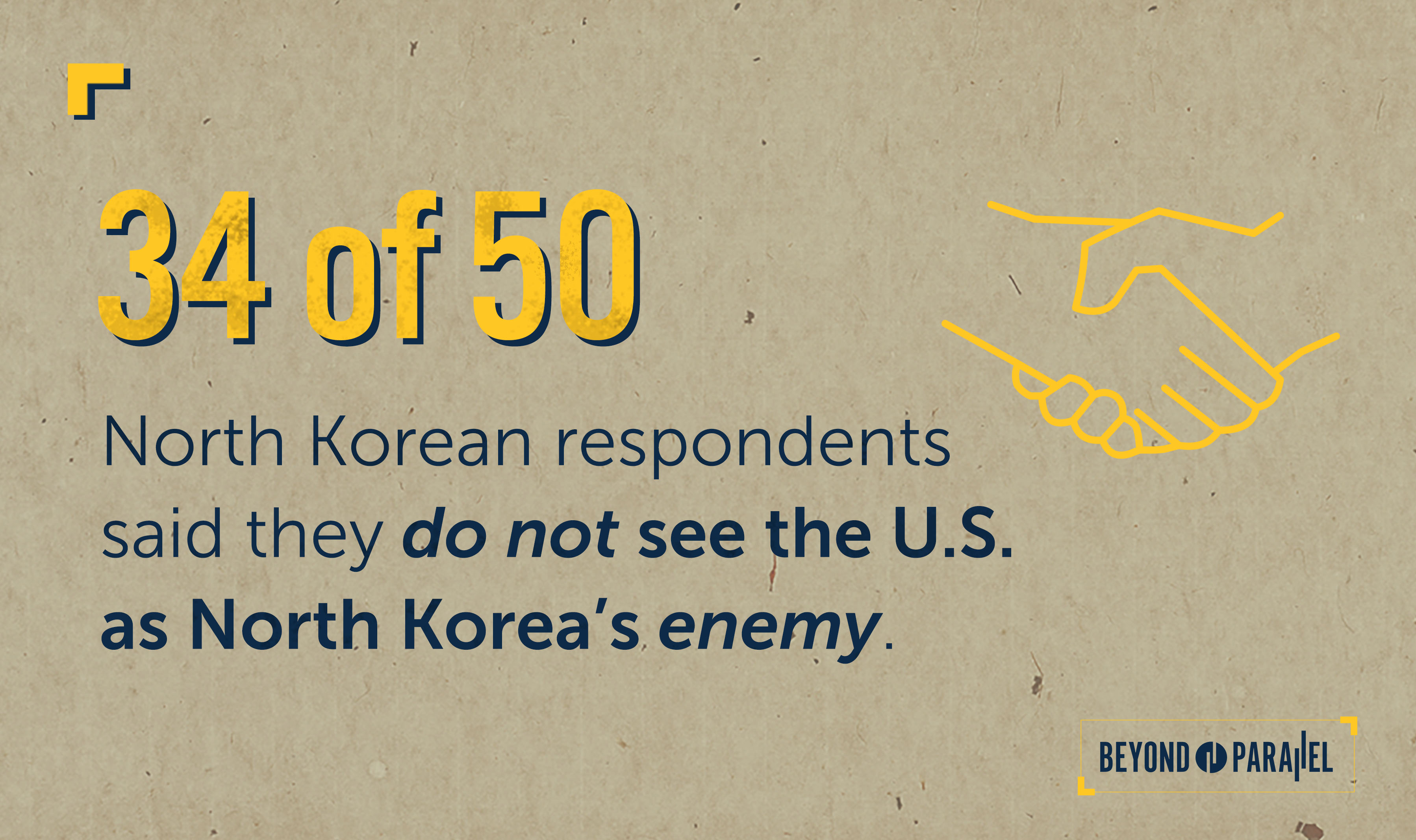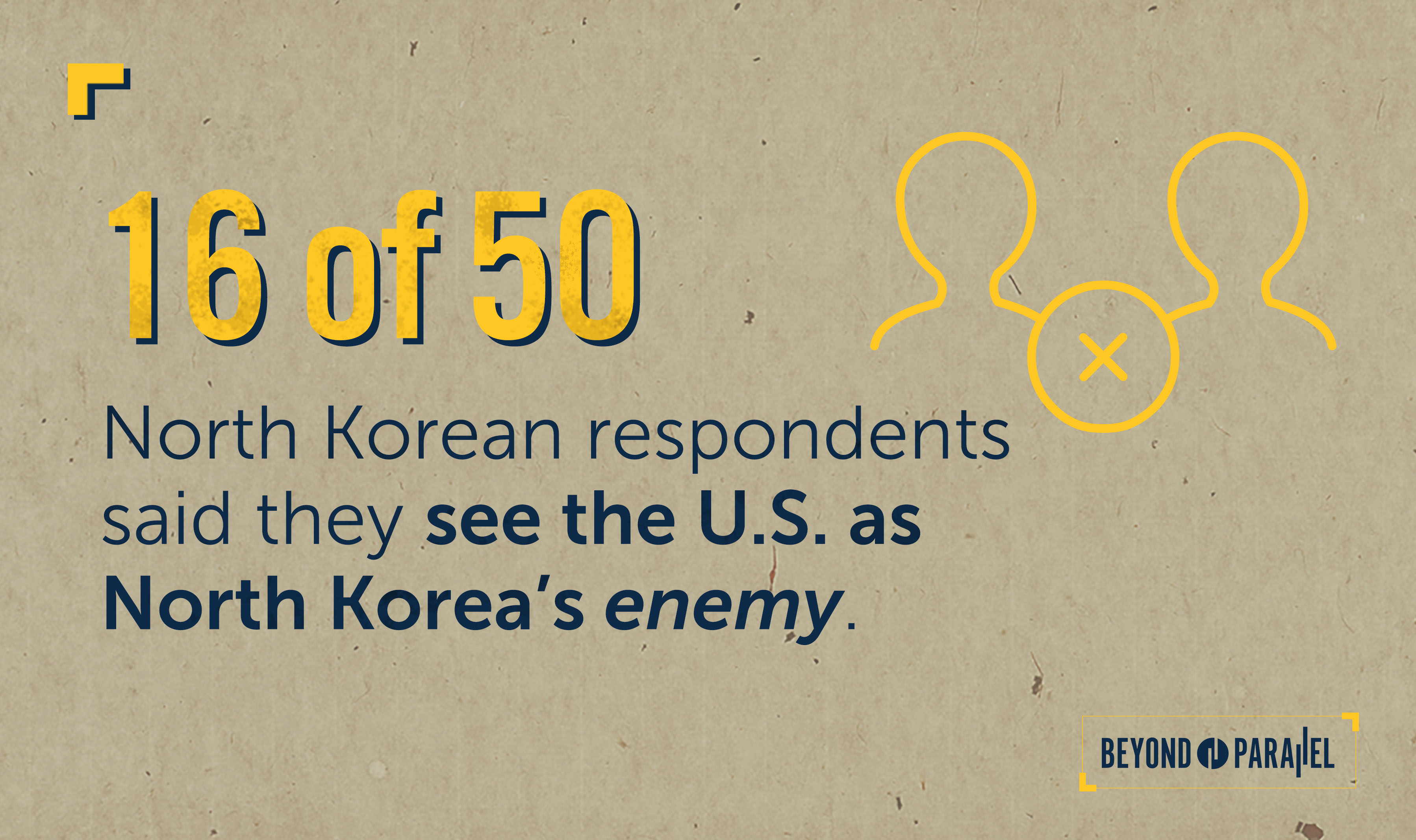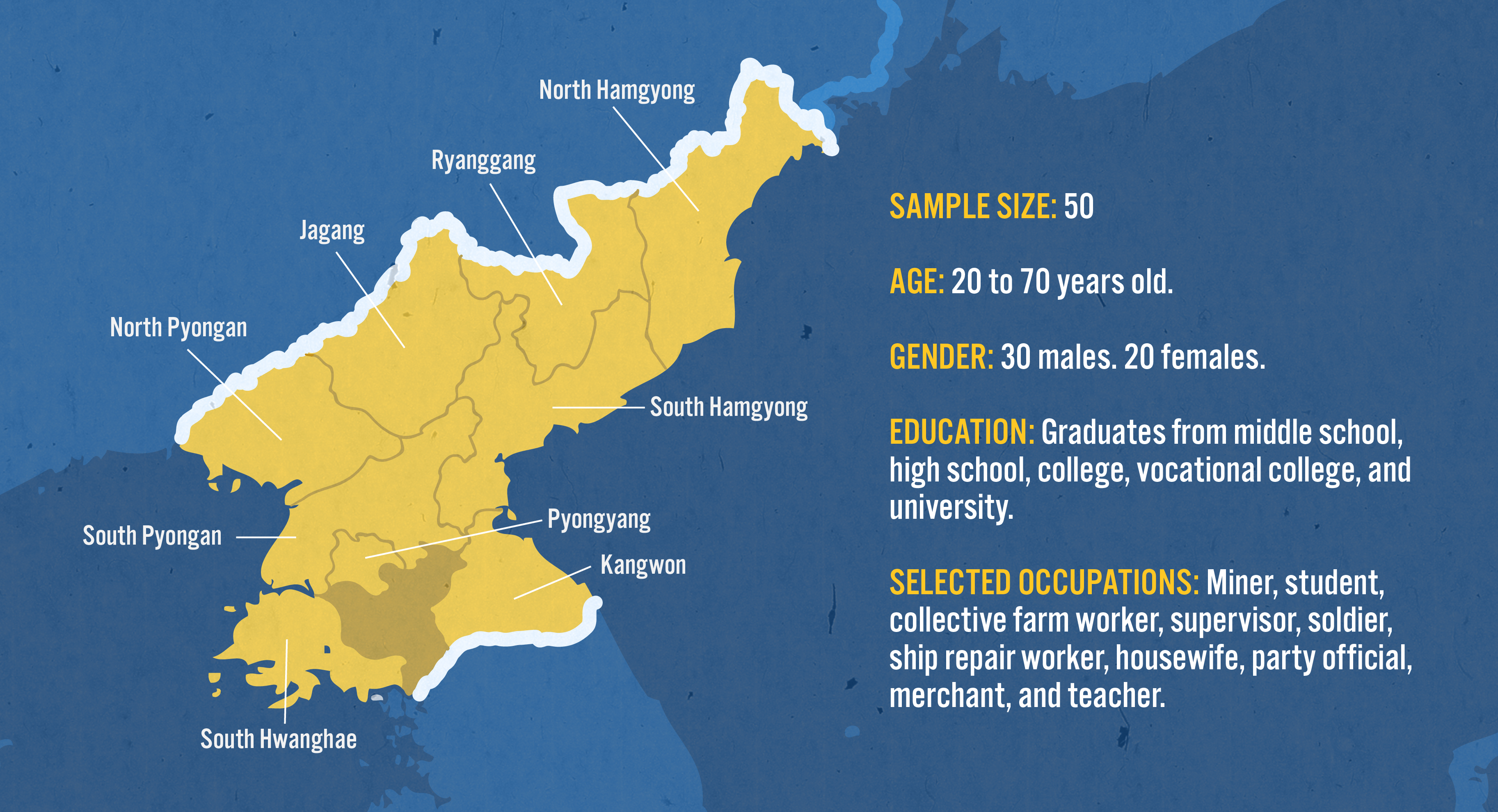Analysis, Foreign Affairs
What Hostile Policy?: North Korean Views of the United States
June 8, 2018, by Victor Cha and Marie DuMond
Share this page
A View Inside North Korea
With the Singapore Summit between Donald Trump and Kim Jong-un on June 12, there is bound to be references made by the North Korean leader to the need to end U.S. “hostile policy” as a precondition for denuclearization. However, CSIS Beyond Parallel research shows that North Korean citizens do not hold uniformly negative impressions of the United States, contrary to the statements of North Korean leaders.
Key FindingsA study commissioned by Beyond Parallel of North Koreans currently living inside the country found that 68% of North Korean respondents do not see the United States as North Korea’s enemy. 32% of respondents said they do think the United States is North Korea’s enemy.
This positive response occurred in 2017, during a period of heightened U.S.-North Korea tensions over nuclear and ballistic missile tests, military exercises, and sanctions. Presumably, these numbers might be even more positive in the current atmosphere of diplomacy.
U.S. negotiators might do well to cite this finding whenever the North Koreans raise U.S. “hostile policy” as a platform for demanding U.S. troop withdrawals or attenuation of U.S. alliance commitments.
North Korean leaders and the state-run media do not paint a good picture of the United States. North Korean leaders, television announcers, and newspaper editors refer to the current American leader as an old mad man or a stupid half-wit. They regularly called President Obama and President Bush dehumanizing and derogatory terms. The United States is often referred to as a pack of robbers or wild dogs. Ever-present propaganda informs North Koreans that Americans are aggressive, hegemonic imperialists. An old adage says that North Korean children are even taught to count by one dead American solider, two dead American soldiers. 1
However, in a 2017 micro-survey of North Korean’s currently living in the country commissioned by Beyond Parallel just 32% of respondents, or 16 of 50, saw the United States as North Korea’s enemy. 68% of North Korean respondents, or 34 of 50, said they did not see the United States as North Korea’s enemy. These responses are particularly interesting in that they were given during a year which saw an unprecedented uptick in the pace and severity of North Korean provocations and weapons tests, U.S. and UN sanctions, and President Trump’s derogatory statements about the North Korean leader. (For more, explore Beyond Parallel’s full database of North Korea provocations.)

Respondents views regarding the U.S. as North Korea’s enemy did not seem to be divided along gender lines. Of the 20 women in the micro-survey, 13, or 65%, said they did not see the United States as North Korea’s enemy. Similarly, 21 of the 30 men in the survey, or 70%, said the same.

These findings in the Beyond Parallel micro-survey contrast with surveys of defectors arriving in South Korea conducted by Seoul National University. When asked which country they had thought was the biggest threat to peace, these respondents overwhelmingly said the United States. China came in second with Japan a distant third. Only a handful had thought South Korea was the biggest threat to peace while almost no one pointed to Russia.
Defector Survey: While you were living in North Korea, which country did you think was the biggest threat to peace on the Korean peninsula?
| Year | United States | Japan | South Korea | China | Russia | N/A |
|---|---|---|---|---|---|---|
| 2016 | 116 | 5 | 4 | 11 | 2 | 0 |
| 2015 | 94 | 18 | 2 | 28 | 1 | 3 |
| 2014 | 107 | 14 | 3 | 21 | 0 | 4 |
| 2013 | 95 | 9 | 2 | 27 | 0 | 0 |
Sources: North Korean Public Perception on Unification (북한주민 통일의식) 2016-2013, Institute for Peace and Unification Studies, Seoul National University (SNU). SNU surveys draw upon a pool of North Korean defectors who have arrived in South Korea during the previous year.
When asked to choose which of the five countries they had felt the most friendly toward while in North Korea, the majority defectors arriving in South Korea choose China while a far distant second choose South Korea. They were least likely to say the United States or Japan. Russia fared only slightly higher on the friendliness scale. Over the most recent years for which numbers are available, these rankings have remained remarkably steady with only slight variations in the exact number of responses.
Defector Survey: While you were living in North Korea, toward which country did you feel the most friendly?
| Year | United States | Japan | South Korea | China | Russia | N/A |
|---|---|---|---|---|---|---|
| 2016 | 0 | 1 | 22 | 106 | 9 | 0 |
| 2015 | 3 | 1 | 33 | 105 | 2 | 2 |
| 2014 | 2 | 0 | 24 | 118 | 4 | 1 |
| 2013 | 2 | 0 | 17 | 109 | 3 | 2 |
Sources: North Korean Public Perception on Unification (북한주민 통일의식) 2016-2013, Institute for Peace and Unification Studies, Seoul National University (SNU). SNU surveys draw upon a pool of North Korean defectors who have arrived in South Korea during the previous year.
Methodological Note
In 2017, CSIS partnered for a second time with an organization that has a successful track record of conducting discrete and careful surveys in North Korea. Beyond Parallel commissioned this organization to administer the questionnaire in eight provinces in North Korea. The questionnaire was carried out as natural in-person conversations between those conducting the interviews and the respondents. The individuals administering the questions are carefully trained to avoid asking leading questions or eliciting specific answers so as to protect both the integrity of the interview project and as well as safety of the people involved in the conversation.

The sampling method we used was non-probability, convenience sampling as accessibility was a prime consideration. An ideal public opinion survey would use a large, random sampling of respondents who do not have any prior relationship with interviewers. However, given the gravity of the consequences faced for expressing opinions in North Korea, the methodology of the interview project commissioned by Beyond Parallel had to be designed to account for the current conditions in the country and protect all involved. Read more about the limitations and merits of conducting surveys in North Korea at The Merits of Conducting Surveys Inside North Korea. To learn more about North Korean’s opinions of the regime, visit our analysis from our first micro-survey at No Laughing Matter: North Koreans’ Discontent and Daring Jokes.
A View Inside North Korea: Additional ReadingThe Devil’s Weapons: What Ordinary North Koreans Think about their Nuclear Program
Paradise Evaporated: Escaping the No Income Trap in North Korea
Meager Rations, Banned Markets and Growing Anger Toward Government
No Laughing Matter: North Koreans’ Discontent and Daring Jokes
Information and Its Consequences in North Korea
ReferencesCha, Victor D. The Impossible State: North Korea, Past and Future. New York: Harper Collins Publishers, 2012. ↩
Related
March Missiles: Predicting North Korea’s Next ProvocationMarch 9, 2017In "Military"
The Devil’s Weapons: What Ordinary North Koreans Think about their Nuclear ProgramMarch 2, 2018In "Analysis"
U.S.-DPRK Negotiations and North Korean ProvocationsOctober 2, 2017In "Analysis"
Share this page
Related posts
When Will the United States Have a Special Envoy for North Korean Human Rights? September 10, 2021, by Robert King
‘Business as Usual’: North Korea Restarts Ballistic Missile Tests March 25, 2021, by Victor Cha
Undeclared North Korea: The Yusang-ni Missile Operating Base (Update since 2019) February 18, 2021, by Joseph S. Bermudez Jr., Victor Cha and Jennifer Jun
The United States Rejoins UN Human Rights Council: An Important Step to Combat North Korean Human Rights Abuses February 12, 2021, by Robert King
KeywordsSurveysU.S.-North Korea Relations
No comments:
Post a Comment